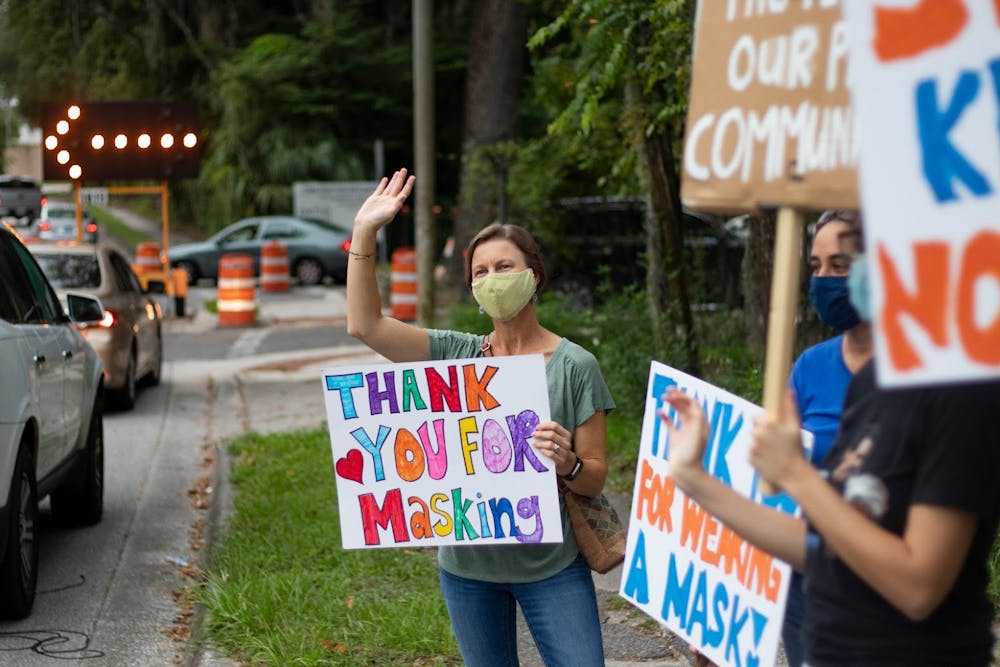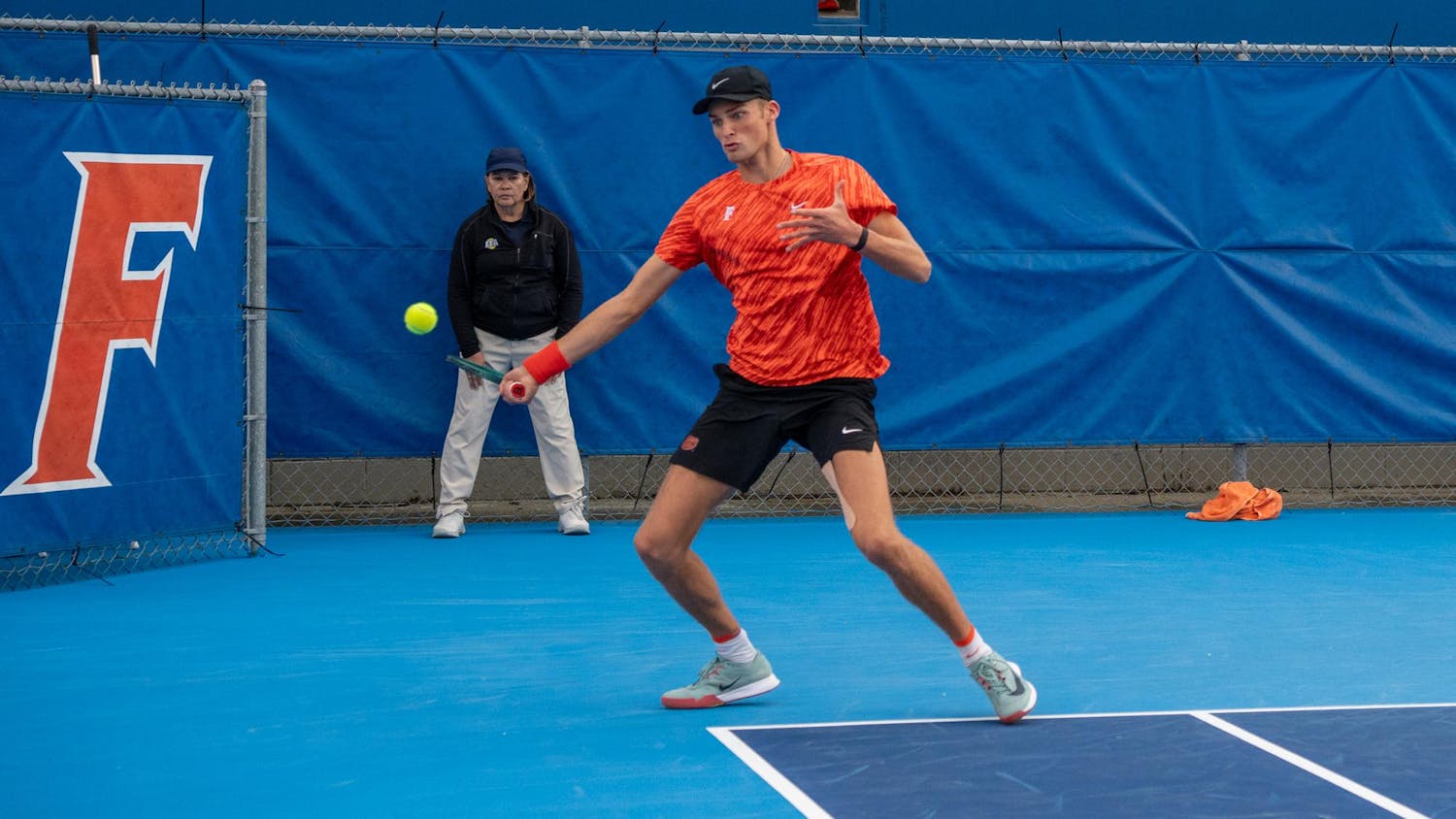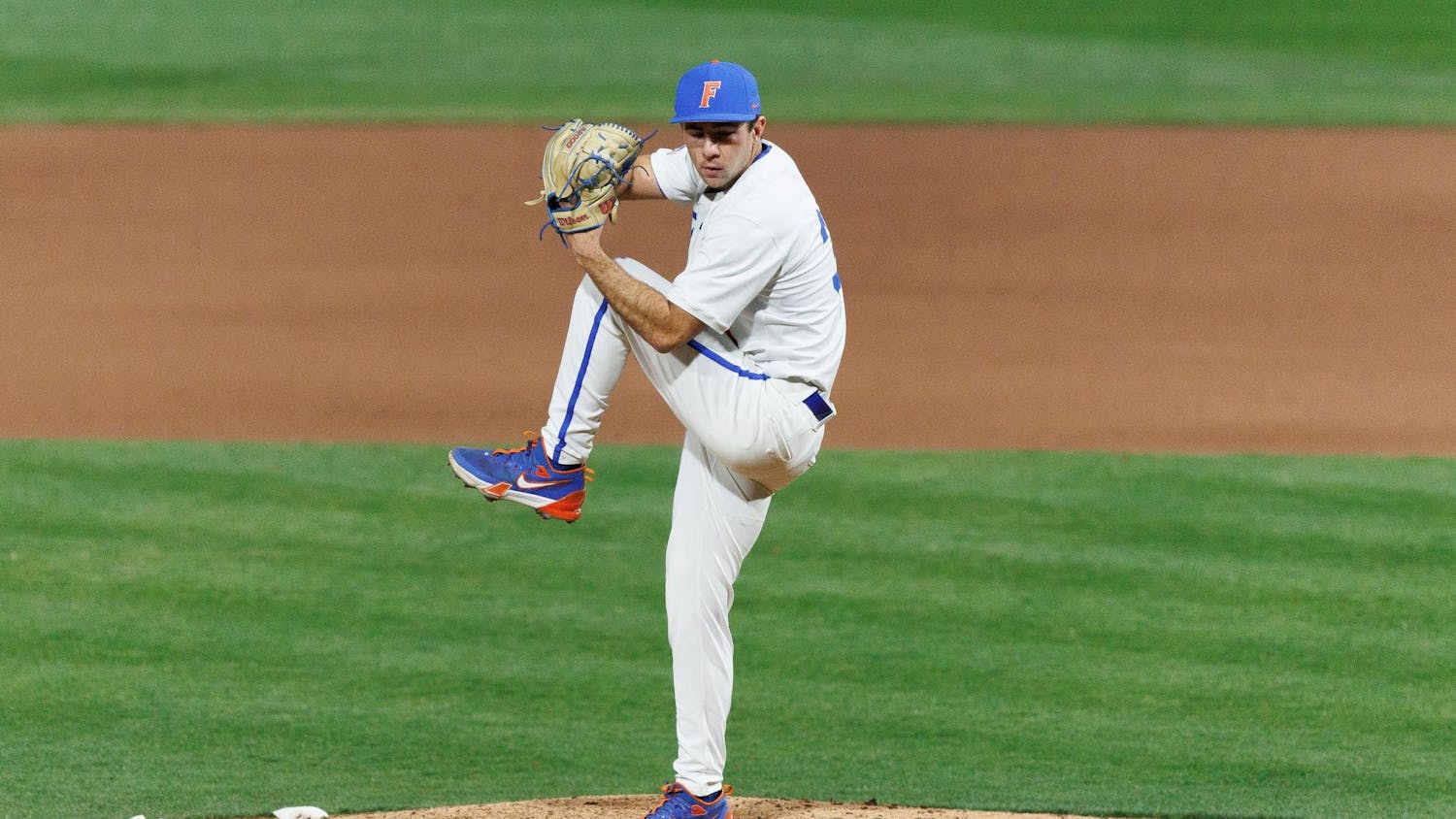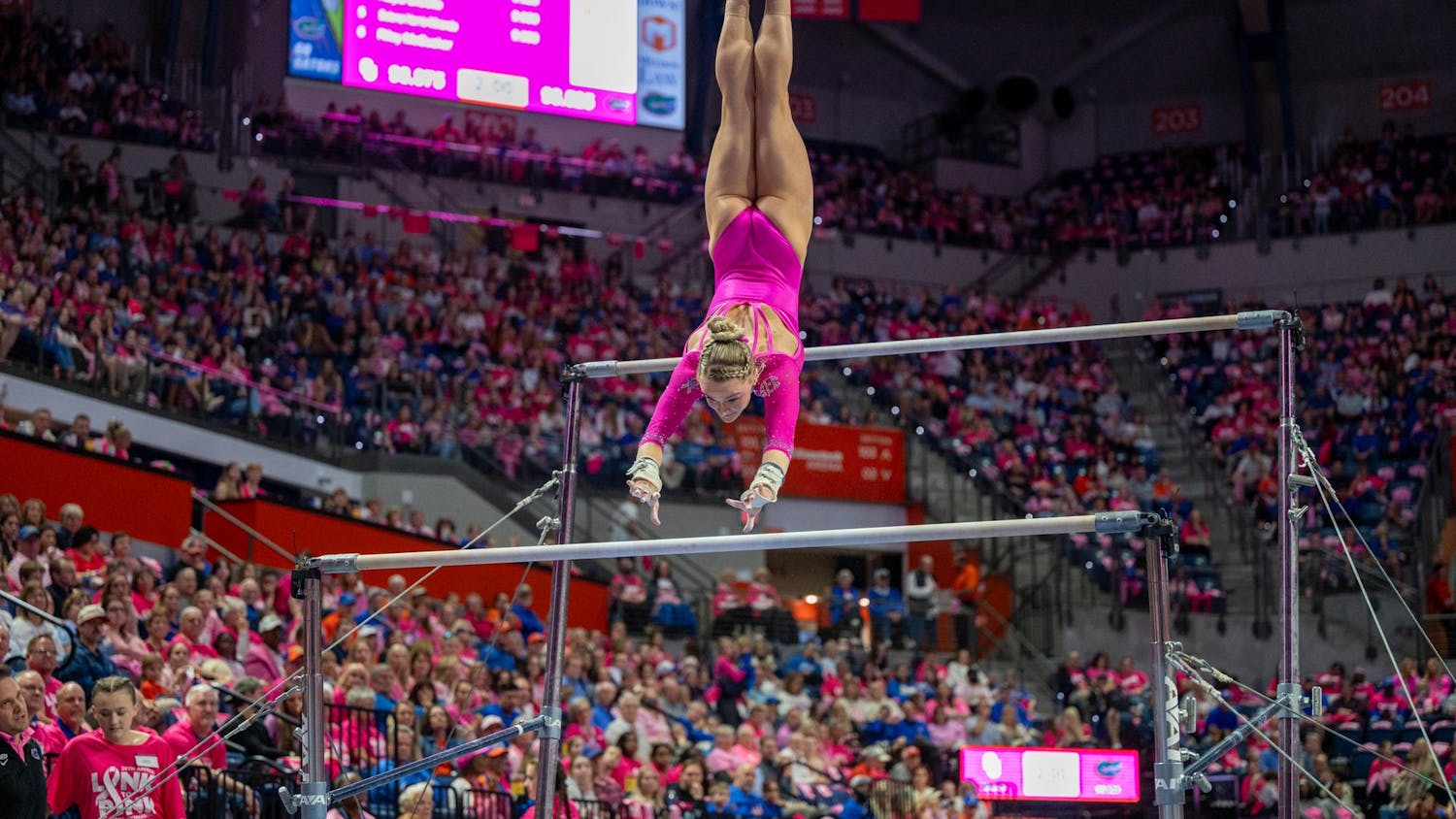As the COVID-19 Delta variant cases and pediatric hospitalizations surge, so do parents' nerves at the start of the new school year.
One out of every four COVID-19 cases reported in Florida from Aug. 13 to 19 were age 19 and under, according to the Florida Department of Health.
Alachua County Public Schools already has students and staff in quarantine as pediatric COVID-19 hospitalizations reach new peaks. The district also retained its mask mandate despite threats from the state. Meanwhile, P.K. Yonge Developmental Research School parents gathered to promote mask-wearing because the UF administration does not mandate them.
Risking school board funding, ACPS refused to comply with a 48-hour state ultimatum to change its required mask policy Aug. 20. With a potential lawsuit on the horizon, school officials said the board’s goal was to protect students, staff and the community.
UF’s labor union sent a letter Aug. 11 in support of ACPS’ mask mandate.
“All students have a right to safe spaces for education,” according to the United Faculty of Florida at UF letter. “Local schools and campuses need to be empowered to make decisions that protect their students, faculty and staff.”
Two weeks into the Fall semester, the whole ACPS district reported 1,156 students and 43 staff members in quarantine — a number that more than doubled since Aug. 13. Fifty new cases were reported on Aug. 20, according to the school district’s COVID-19 dashboard.
Meanwhile, parents’ decisions of what learning options are best for their children could be impacted as pediatric COVID-19 hospitalizations are on the rise. Alachua County reported a record 14 pediatric hospitalizations Aug. 18, according to the county COVID-19 dashboard as of Sunday. UF Health Shands Hospital reported more children in its intensive care unit than ever before Aug. 12.
Masks remain optional at UF’s P.K. Yonge Developmental Research School
On Aug. 16, students settled into their second week at P.K. Yonge with more than 10 pro-mask demonstrators at the entrance at about 7 a.m. Because the school is affiliated with UF, masks remain optional.
As the winding conveyor belt of cars dropped children off, they peered curiously out the windows, toying idly with their face masks. Occasionally, parents offered a honk in solidarity for the demonstrators.
Parents held signs that stated, “Masking for a friend,” and “Spread kindness not germs!”
Geraldine Klarenberg, UF professor and P.K. Yonge parent, said she was excited to see the ACPS temporary mask mandate, but disappointed with P.K. Yonge.
“We banded together with a whole bunch of parents, and we decided to do some positive messaging,” Klarenberg said. “It’s part of being kind to wear your mask for each other and not just for yourself.”
With two vaccinated children of her own in middle and high school, she worries for her ineligible and unvaccinated stepson at home. Activists started a petition, which Klarenberg signed, and wrote a letter to the P.K. Yonge administration and Florida Board of Trustees, demanding mandatory masks indoors for the Fall.
It accumulated more than 200 signatures and later presented the letter to UF President Kent Fuchs and the P.K. Yonge administration.
“Now is the time to act with courage and ethics,” according to the letter. “It is up to you to show our students that science speaks louder than threats, that safety matters more than politics, and that their lives matter.”
Chris Demers, UF faculty and parent of an eighth- and 11th -grader at P.K. Yonge, felt compelled to come out and demonstrate with a positive message for masking. Politics are coming before safety, he said.
“We don’t feel like PKY administration is taking this surge very seriously,” Demers said. “This Delta variant is nothing to mess with.”
On his daughter’s first day of class on Aug. 10, she told him she and one other student were the only ones wearing masks, although that has begun to change.
Experts on how to limit classroom spread
UF Health hosted a well-attended town hall webinar on how to protect children going into the new school year and ease parents’ fears over the Delta variant surge.
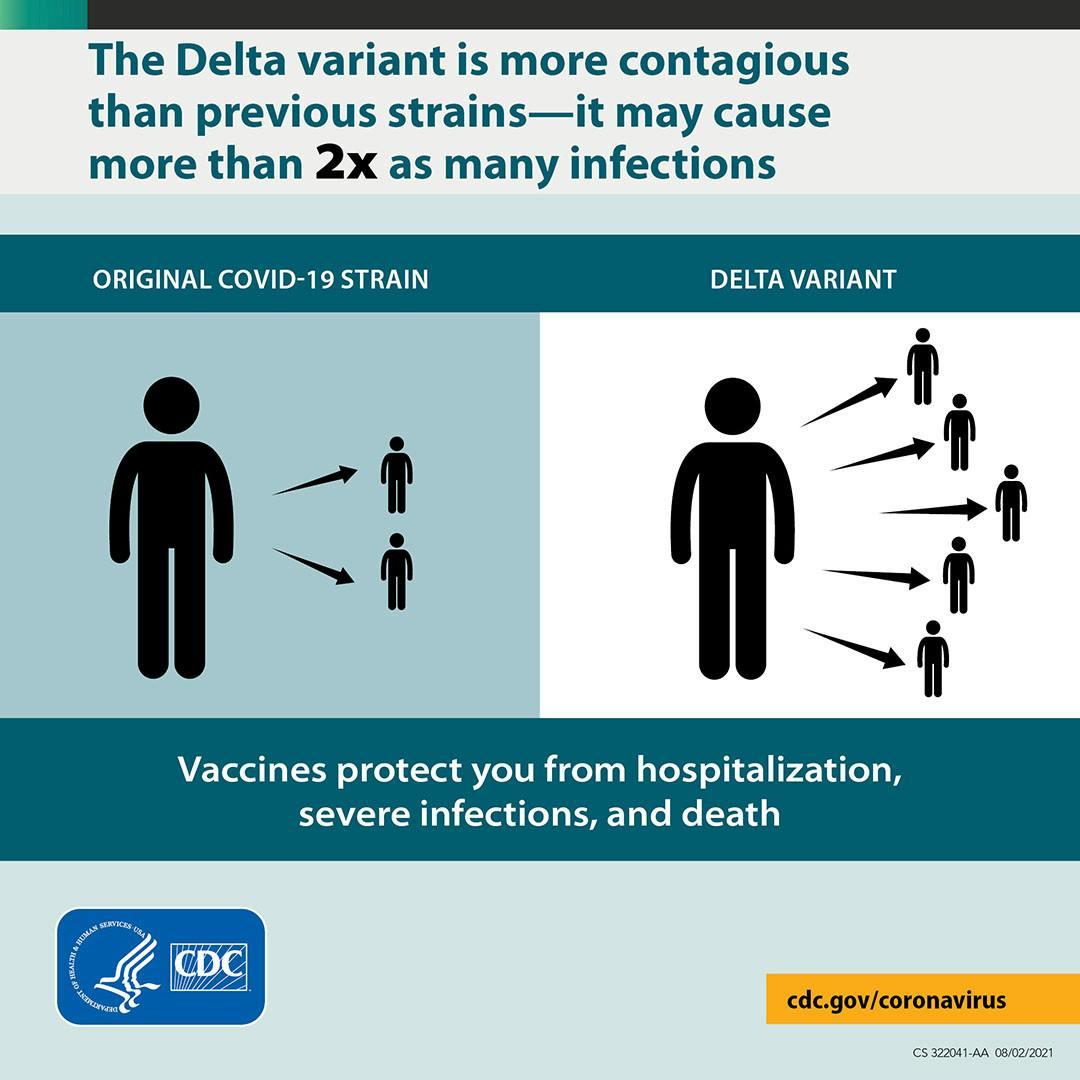
“Now with relaxed social measures also adding to it, it’s spreading like wildfire,” Dr. Kartik Cherabuddi with UF Health Infectious Diseases said.
New COVID-19 variants are likely, Cherabuddi said, if vaccine rates don’t dramatically increase.
“That’s the biggest reason to get vaccinated now,” Cherabuddi said. “So we don’t let these viruses get ahead of us and mutate so they can escape from the vaccine or be more infectious.”
Toward the end of June and July, COVID-19 hospitalizations and ICU numbers rapidly increased, he said.
“Every single day, we’re having more patients than we had the day before,” Cherabuddi said. “The hospital is just full.”
Dr. Sonja Rasmussen of UF Health Pediatrics and Epidemiology pointed to studies that have shown people are twice as likely to be hospitalized if infected with Delta and with unvaccinated people at the greatest risk. The vaccine offers the best protection against symptomatic disease, hospitalization and death, she said, pointing to the high unvaccinated rate among hospitalizations.
The U.S. had a record-breaking number of children hospitalized with COVID-19 Aug. 14, according to Reuters, which is a problem for ACPS families with children under 12 not eligible for a vaccine.
Many people believe children are at lower risk for COVID-19, Rasmussen said, but that is compared to people 65 years and older.
“It’s not that they’re at no risk,” she said. “Some kids are ending up in the hospital. Some are ending up actually even dying.”
Children can get infected, can get sick enough to be in the hospital and can die from COVID-19. More than 400 children reported in the U.S. have died from COVID-19 since the pandemic began, Rasmussen said.
About three-quarters of those children had underlying conditions. Risk factors include obesity, heart disease, lung disease and diabetes. The others were previously healthy, she said.
Some children develop “long Covid” with long-lasting brain fog, severe fatigue and heart palpitations. Although rare, some children develop Multisystem Inflammatory Syndrome or MIS-C, about two to four weeks after the initial viral infection, impacting multiple body systems, including heart, gastrointestinal and lung, she said.
“This is a very severe condition,” Rasmussen said. “About 80% of those kids require care in an intensive care unit.”
Teachers, staff and students who are eligible for the vaccine should receive it, and those older than two years should wear face masks, according to the American Academy of Pediatrics and Centers for Disease Control and Prevention, she said.
Rasmussen recommended schools implement measures like COVID-19 social distancing, testing, quarantining, improved ventilation, cleaning and disinfecting, as well as universal indoor masking regardless of vaccination status.
The Pfizer vaccine, currently authorized for children 12 and older, is safe and effective for this age group, as more than 11 million children under 18 have already received at least one dose of the vaccine.
Face masks with one to three layers are ACPS students' first line of defense, Cherabuddi said.
For kids at high risk, he said eye goggles are a reasonable measure. Face shields are not necessary, but they provide some additional protection.
After the FDA reviews youth vaccine studies, it should be available for school-age children first, most likely five to 11 years of age, and eventually younger children. The studies are predicted to be completed in September or early October, Rasmussen said.
She said when children remove their masks at lunch, they should be far apart outside, eat quickly and not talk to avoid spreading virus particles into the air.
Cherabuddi pointed to the importance of improving ventilation in schools. If there were smoke indoors, switching on a fan would still retain the smoke.
“You open up a window or a door, then the smoke’s gone in no time,” Cherabuddi said. “I think that’s the best way to think about decreasing risk of COVID with ventilation.”
Some parents have voiced concerns over masks, but Rasmussen said there has been a lot of misinformation.
“I have not seen any study that’s been published in a quality journal saying anything about masks being risky,” Rasmussen said.
At the end of each day, masks may accumulate some saliva, but she said parents can wash them.
“Us as physicians have worn masks all day for many, many years,” she said. “We haven’t had adverse effects.”
The end of the surge depends on the effort people put into following protective guidelines, especially mask-wearing, Cherabuddi said.
“Let’s just make sure we handle this final battle of the war well,” Cherabbudi said. “The stakes are high — we can’t let our kids get sick, even one kid getting hospitalized, God forbid dying, is one too many.”
Contact Alexandra Harris at aharris@alligator.org. Follow her on Twitter @harris_alex_m.
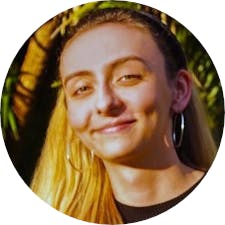
Alexandra is a senior journalism major reporting on Science/Environment for The Alligator. Her work has appeared in The Gainesville Sun, and she filed public records requests for the Why Don't We Know investigative podcast. She has a passion for the environment.


